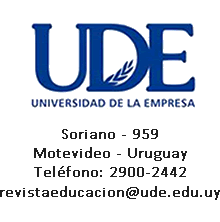Levels of awareness in the use of ICTs taken to research in Education
DOI:
https://doi.org/10.48163/rseus.2024.12126-37Keywords:
TIC y Educación, Niveles de Conciencia, DocenciaAbstract
Education, as well as the use of ICT, are characterized by the social and cultural essence that demarcates them. For this reason, when investigating them it is essential to look at them comprehensively, interpreting them from the individuals who star in it, but also from their groups, their history, their context. Based on this, the concern arises to present a methodological alternative that allows comprehensive knowledge of the levels of awareness in the use of ICT in the educational context, from its protagonists. To achieve this, the Dynamic Spiral of Development adapted to the Levels of Consciousness in the use of ICT is taken as a support point, a theoretical approach that arises from two of the most significant foundations of the Integral-Holonic approach: the holographic theory and the Spiral Dynamics. Each level of consciousness gives the possibility of describing a perspective of ICT and the potential of the subject who uses them. In the spiral there are seven levels through which you can travel and deepen these potentialities, understanding that the stages or levels are not exclusive. Each level represents a representation of ICT in the educational context in which the participating subjects operate, but also implies the possibility of moving to any of the other levels of the spiral. The theoretical and methodological aspects that frame the identification of these levels of consciousness make it possible to guarantee scientific rigor in the research. Which leads to a more accurate approach to said reality.
Downloads
References
Ameigeiras, A. (2006). El abordaje etnográfico en la investigación social. En I. Vasilachis (Coord.), Estrategias de investigación cualitativa. Barcelona, España: Gedisa
Barbera, N. y Inciarte, A. (2012). Fenomenología y hermenéutica: dos perspectivas para estudiar las ciencias sociales y humanas. Multiciencias, 12(2), 199-205. Recuperado de: http://www.redalyc.org/articulo.oa?id=90424216010
Díaz, L. (2011). Visión investigativa en ciencias de la salud (Énfasis en paradigmas emergentes). Trotsky Vargas – Luis García.
Martínez, M. (1998). Investigación Cualitativa Etnográfica en Educación. (3ra ed). México: Trillas
Rodríguez, G., Gil, J. y García, E. (1996). Metodología de la Investigación Cualitativa. España: Ediciones Aljibe
Strauss, A y Corbin, J. (2002). Bases de la investigación cualitativa. Técnicas y procedimientos para desarrollar la teoría fundamentada. Editorial universitaria de Antioquía.
Taylo, S. y Bogdan, R. (2000). Introducción a los metodos cualitativos de investigación. La búsqeda de significados. Ediciones Paidós Ibérica, S.A.
Wilber, K. (2000). Integral Psychology. Consciousness, spirit, psychology, therapy. Bosto-U.S.A.: Shambhala Publications, Inc
Wilber, K. (2006). Los tres ojos del conocimiento: la búsqueda de un nuevo paradigma. 5ta ed. Barcelona-España: Editorial Kairós, S.A.
Wilber, K.(ed) (2008). El paradigma holográfico: una exploración en las fronteras de la ciencia. 7ma ed. Barcelona-España: Editorial Kairós, S.A.
Wilber, K. (2017). Una teoría del todo: Una visión integral de la ciencia, la política, la empresa y la espiritualidad. Traducción del inglés de David González Raga. 5ed. Barcelona. España: Editorial Kairós, S.A.
Additional Files
Published
How to Cite
Issue
Section
License
Copyright (c) 2024 Marymili Segura Vera

This work is licensed under a Creative Commons Attribution 4.0 International License.
Política para revistas de acceso abierto
Los autores/as que publiquen en esta revista aceptan las siguientes condiciones:
a. Los autores/as conservan los derechos de autor y ceden a la revista el derecho de la primera publicación, con el trabajo registrado con la licencia de atribución de Creative Commons (CC-BY), que permite a terceros utilizar lo publicado siempre que mencionen la autoría del trabajo y a la primera publicación en esta revista.
b. Los autores/as pueden realizar otros acuerdos contractuales independientes y adicionales para la distribución no exclusiva de la versión del artículo publicado en esta revista (p. ej., incluirlo en un repositorio institucional o publicarlo en un libro) siempre que indiquen claramente que el trabajo se publicó por primera vez en esta revista.






















